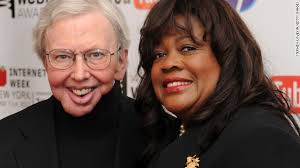Life Itself: Review
On the second day of Doc/Fest, I went to see Life Itself: the biopic of acclaimed American film critic, Roger Ebert (you can see the trailer, here). Director Steve James shot the film in the Autumnal years of Ebert’s life; the first decade of the millennium was disastrous for Ebert’s health, and he suffered furious bouts of cancer which rendered him hospital bound, unable to speak. This lost, jovial man is a giant leap from the outrageous, acerbic wit that James depicts through interviews with colleagues and friends, archival footage and photos.
Ebert was born to an electrician and a housewife, and from high school, worked prodigiously to elevate himself beyond his working class background. Despite this, he never truly lost touch with his roots. He spent almost his entire career as film critic of the Chicago-Sun, which – in opposition to the patrician Chicago-Tribune – catered to African-Americans and the working class. In the early days of his career, Ebert would ‘hold court’ in bars, where he and his colleagues became riotously drunk. Famed for his boisterous antics amongst the local press, a friend reveals that Ebert would occasionally walk home in the early hours of the morning, ‘wishing he was dead’ – one of many small but humanising touches of the documentary.
The film covers a bizarre moment in Ebert’s career when, at the bemusement of his friends and colleagues, he collaborated with famed chauvinist and breast aficionado Ross Meyer to create the sex-ridden flick, Beyond the Valley of the Dolls. The film flopped hard, despite receiving a cult following today. In a grainy glimpse of footage, Ebert admits, ‘I just wanted to get laid’.
Perhaps the most iconic period of Ebert’s career is his affiliation with rival film critic, Gene Siskel. Together, they presented the bi-weekly film review show Sneak Previews which helped transform film criticism into a reputable, serious discipline. The pair were hugely competitive: they trade verbal barbs with each other off air, and Siskel’s wife treats us to a memorable anecdote which humorously captures the awkward and often frosty relationship between the pair.
The interviews with Ebert’s family are the most telling moments of the documentary. Despite his caustic reputation on screen, Ebert is a man clearly capable of great warmth and enthusiasm. The film serves as a meditation on death as much as a biopic of Ebert, and it is somewhat ironic that the lucid, flapping-jawed critic is forced to communicate through a computer towards the end. But don’t expect the wisecracking Ebert to wallow in self-pity: he remains upbeat all the way through.
More than a fantastic documentary of one of the world’s most influential film critics, but also a life-affirming tale.



Recent Comments